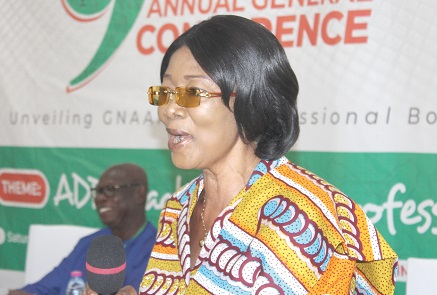
Association of ADR Practitioners urged to discipline errant members
A Court of Appeal judge, Justice Irene Charity Larbi, has urged alternative dispute resolution (ADR) practitioners to, without fear or favour, enforce disciplinary rules against members who flout the code of conduct of the profession.
She said the Ghana National Association of ADR Practitioners (GNAAP), which has now become the professional body of ADR practitioners in the country, must ensure that its members upheld best practices and principles of the profession to ensure that issues of disputing parties were duly settled.
“Being a member of a profession or a professional body, generally, is seen as an indicator of integrity, ethics, trust and expertise, and this is possible if your association does not compromise on the ethical obligations of its members and enforces all your disciplinary rules against whoever goes against them, without fear or favour.
“Your members, as conciliators, reconciliators, peace-makers and dispute resolution practitioners, find themselves in a fiduciary position and must, therefore, live above unethical misconduct,” she added.
Justice Larbi, who is also the judge in charge of the ADR Programme of the Judiciary, was speaking at the ninth annual general conference of GNAAP in Accra last Saturday.
The conference, on the theme: “ADR practice as a profession”, brought together ADR practitioners in both private and public service to learn about current trends in the profession and how to be relevant in the evolving justice system.
Newly qualified members were also sworn in after meeting the requirements established by the association, which has now attained a professional body status.
Reforms
Justice Larbi said recent legislative reforms had extended the use of ADR to cover critical aspects of the country’s legal processes in such a manner that the outcome of ADR processes did not only affect domestic and traditional informal endeavours but also assumed critical equitable and legal interest in disputing parties, including criminal justice.
She said it was, therefore, not enough for one to obtain a certification in ADR practice without knowledge on cases not amenable to ADR.
She said it was for that reason that ADR practitioners must observe the ethics of the profession — principles of natural justice and matters affecting conflict of interest, privacy and confidentiality.
“As arbiters, you must uphold the principles of natural justice and ensure you give fair hearing to parties who appear before you and refrain from being judges in your own cause,” she added.
Representation
The President of the GNAAP, Daniel Owusu-Koranteng, described as unfortunate the fact that the ADR fraternity had no representation in the structure of the ADR Act, such as the ADR Centre, which has the broad responsibility in the promotion of professional ADR practice in the country.
With the birth of GNAAP as an ADR professional body, he said, “there can be no excuse for the continued inertia in amending the ADR Act, 2010 (Act 798) to include an ADR representative on the Governing Board of the ADR Centre to pave the way for the establishment of the centre to perform its functions to promote professional ADR practice in the country”.
Mr Owusu-Koranteng said the association had positioned itself to improve ADR practice in the country.
